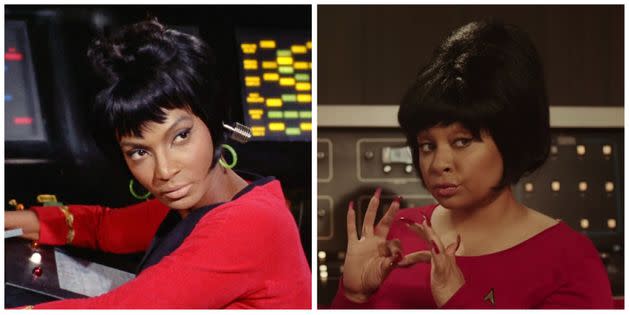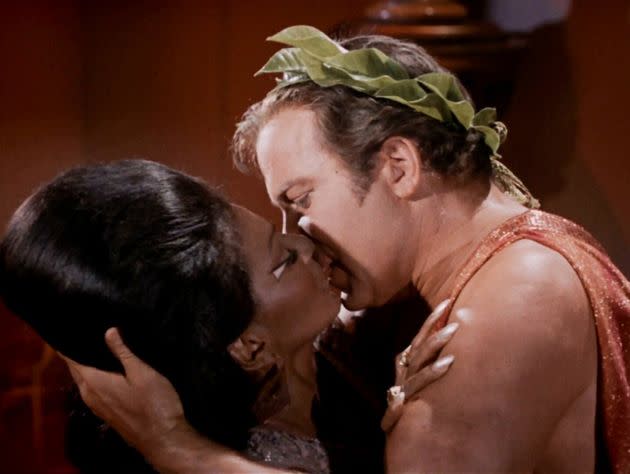Resurfaced ‘Drunk History’ Clip Tells How Nichelle Nichols ‘Literally Integrated Space’

Nichelle Nichols and Raven-Symoné as Nichols on “Drunk History.” (Photo: CBS Photo Archive / Contributor via Getty/Screenshot “Drunk History”/Comedy Central via YouTube)
Nichelle Nichols played a key role in helping others live long and prosper.
After news broke that the “Star Trek” icon died Saturday in Silver City, New Mexico, at the age of 89, tributes to the pioneering actor flooded social media.
One of these salutes was by comedian Ashley Nicole Black, who tweeted that Nichols’ “beautiful legacy” was an example of “what it really means to use the platform you have to make the world a better place.”
Nichelle Nichols left behind such a beautiful legacy of what it really means to use the platform you have to make the world a better place. I think of her example often and I hope others will too. Rest well, Lt.
— Ashley Nicole Black (@ashleyn1cole) July 31, 2022
“I think of her example often and I hope others will too,” Black wrote before offering an actual example of how Nichols’ decisions helped others aim for the stars.
Black tweeted a clip from a “Drunk History” episode she narrated about Nichols’ life.
In the 2018 clip, Raven-Symoné plays Nichols in a reenactment of the famous moment in which Martin Luther King Jr. helped Nichols realize how much her role as Lt. Nyota Uhura — who was the communications officer on the Starship Enterprise in the original “Star Trek” TV series — meant to Black Americans.
In the clip, Black tipsily paraphrased that Nichols was thinking about quitting “Star Trek” right before attending an NAACP fundraiser that Nichols and King both attended. At the event, King gushed about “Star Trek” to Nichols and told the actor she couldn’t quit the show because, as Black paraphrased:
“’You are the only Black woman on television who doesn’t play a servant. You’re the only person out there providing hope to Black people that there’s a future where maybe they won’t be seen as less than, and they’ll be seen as equals”
Nichols shared the story of her interaction with King as well during a 2011 episode of PBS’ “Pioneers in Television.”
“He was telling me why I could not [resign],” she recalled on the show in 2011. “He said I had the first nonstereotypical role, I had a role with honor, dignity and intelligence. He said, ‘You simply cannot abdicate. This is an important role. This is why we are marching. We never thought we’d see this on TV.’”

Nichelle Nichols as Lt. Nyota Uhura and William Shatner as Capt. James T. Kirk in the 1968 “Star Trek” episode "Plato's Stepchildren." (Photo: CBS Photo Archive via Getty Images)
The “Drunk History” clip also covers how Nichols made history in November 1968, when her “Star Trek” character kissed Capt. James T. Kirk, played by white actor William Shatner — which is often credited as the first interracial kiss on American television.
Black touches on how Nichols dedicated decades of her life to advocating for space exploration as well, particularly among women and minorities.
Nichols launched a consultant firm, Women in Motion, which partnered with NASA to recruit minority and female personnel for the space agency. Her recruits included Guion Bluford, the first African American astronaut in space; Sally Ride, the first female American astronaut; and Mae Jemison, the first Black woman to travel into space.
“So, Nichelle Nichols was the first Black lady to go to space for fake, and she recruited the first Black lady to go to space for real,” Black explained on “Drunk History,” adding: “She literally integrated space.”
It also seems that Nichols was a fan of the “Drunk History” tribute to her life.
“She reached out to the show after it aired to say she was pleased with it,” Black tweeted.
This article originally appeared on HuffPost and has been updated.

 Yahoo Movies
Yahoo Movies 